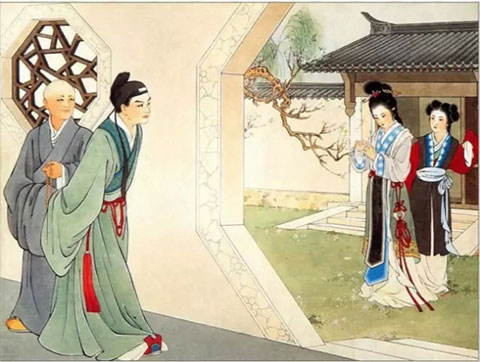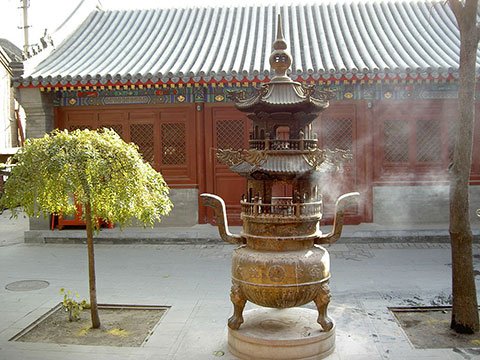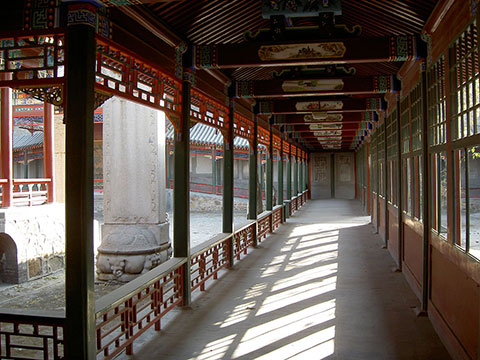 56
56
Connecting:
- the bottom line with the feet,
- the second line with the legs,
- the third with the belly,
- the fourth with the arms and back,
- the fifth with shoulders and face and
- the top line with the brain.
- the outer trigram is ☲ (離 lí) radiance = (火) fire
- the inner trigram is ☶ (艮 gèn) bound = (山) mountain
The Only Way Out is Through
Hexagrams 55 & 56
battling versus adapting
Hexagram 55, preparing own's battle
This hexagram seems a very good and prosperous one, but for Wu, it was a time of the biggest hardships he had ever endured. It seemed as if everything worked against him. His father died, allies were difficult to find and difficult to convince, the weather was awful, and on top of all that there were the omens ...
He could only succeed because he had such a tremendous will to fulfil his task. "The king
serves it" - a good king is not a boss, he is a servant of his people and of his task.
Wen, lord Chang, the father of Wu, founded his capital at the foot of mount Qi. He was at that time Xibo, Earl of the West, later he would become king Wen. His territory was very small, only a hundred square li, so probably the capital was rather a village. When he was preparing to attack king Zhou of Shang he moved 70 miles Southeast to Feng. Feng was an advance post from where it would be easier to attack the Shang, and excavations show it was rather a military garrison than a city.
The city of Shang, Dayi Shang, was another 380 miles further, to the Northeast.
In Feng, Chang Xibo built a tower, a Lingtai, translated as divine/magic/skyward tower. (língtái: the locale of one's spirit; terrace where emperors watched heavenly phenomena).
The Huainanzi suggests he built it for fooling king Zhou into believing he was not interested anymore in serious matters and no threat for the Shang. But probably it was for searching the skies (sun and stars) for signs, omens which could tell him about favours of gods and spirits, about things bound to happen and about the best course of action. ‘Active all day long, at night apprehensive’ (hex.1.3)
He died before he could attack the Shang, and his son, Wu, had to start the time of mourning: staying away from daily life for three years. This is described in the top line of hex.55.
Wu asked the oracle about mourning, and the oracle said: pitfall. He asked about not mourning, and the oracle said: no mourning, a Yi sacrifice at noon.
At that moment there were omens, maybe sunspots. The third line probably has to do with this: ‘at noon rain-curtains, froth was seen’. Sunspots look as if something is passing in front of the sun. Birds or something else, a curtain of sorts maybe. They can be explained by a bright general as: “the sun is not eaten, a rain-curtain has passed before it, and like on earth, it is a sign of new growth. After the drought of winter, when the rains come, the fields can be worked again, a seed can be sown. These "curtains" are a sign of the fall of a dynasty – Shang of course – and a sign of new beginnings”.
I do not know if he said these things of course. Maybe sunspots were explained as crows passing by instead of eating the sun like in an eclipse. Maybe the rain was actually rain and had nothing to do with the omen of the sun.
The Zhou attacked with the help of allies: described in line 1 and 4. In line 1 it is an allied lord, in line 4 one of the barbarians. When Wu set out to conquer Dayi Shang, many ´great princes of friendly states´ joined in the battle. Some of these were befriended with the Zhou, but others joined only for the mutual goal. With a friend, one has to consider the borders of what one can demand or tolerate, the contact itself is no problem. If one behaves oneself ´like a friend´: not jumping up at a saying, not reacting with suspicion or disdain, then the friend will stay a friend, even in tough circumstances.
But with a ´barbarian´, where the exchange is tense, one has to restrain oneself, weigh every word carefully, and, if possible, try to find an opening for contact by searching for mutual grounds. Meet him halfway, but without making yourself vulnerable.
Line 4: even those who were usually not friends (the tribe of Yi) came to help, but everyone had to hide his true feelings for the time being (line 4 changes to hex.36)
Line 5: ‘rewards come’, changes to hexagram 49, about revolution, changing the mandate. ‘The great one changes like a tiger, he finds belief (or his truth shows) even before the augury’: for the army, Wu did not need the oracle’s sanctioning, his power of action and expression convinced them. He was like the ´Tiger Braves´, the 3000 men in his army who excelled above all others, and who were trained in battle tactics by Taigong.
But Wu gathered only after the verification of his having the mandate (line 2).
Line 3: At Feng rain-curtains. At noon one sees froth. Breaking one´s right arm, no-fault.
The rain-curtains are Pei4, profusion, "Heavy rain, sudden rain; abundant; marsh; N. pr. of a river" –Karlgren (1923).
Marshall p.76: Shi Ji 32 states that King Wu wished to attack King Zhou and performed tortoise divination, but the results were not auspicious, and violent wind and rain arose as additional bad omens. The assembled dukes were afraid, but Taigong, the king´s commander and military strategist, ´stiffened them to support King Wu´. King Wu then marched on the Shang.
And Marshall p.189, n.36: The Han Shi Wai Zhua also mentions the bad omens of King Wu´s shield breaking in three places and it raining continuously for three days, which Taigong re-interpreted favourably to spur both the king and the troops on to victory.
Wu having his arm broken is also mentioned somewhere, but I could not find that any more.
Hexagram 56, surviving in unknown or hostile territory
Hex.56 is about new or unknown circumstances. New people, a new country, new experiences. When one does not know the habits or facts one might encounter, then one should be extremely modest and careful.
Don't break out a wall in a house you hardly know, don't make jokes in a new job, don't be impulsive toward a stranger, don't criticize people in another country. All these mistakes might cause severe harm.
About losing sheep/cattle at Yi (in hex.34 sheep, in 56 cattle):
Whincup, p.121 (hex.34): This refers to the story of the Shang ancestor King Hai, a story which has been reconstructed from various ancient references (Gu, 1931). King Hai (Wáng Hài) was probably a herdsman who crossed over with his sheep and oxen from his own land to the neighbouring territory of Youyi. He lived there happily for several years until he made the mistake of committing a serious crime, perhaps adultery with one of the ruler’s women. His herds were confiscated and he was put to death. He gained his royal title only much later when his descendants founded the Shang Dynasty.
Kerson Huang: The I Ching most likely had its roots in the divination traditions of the Shang. The Shang people deified their ancestors, to whom periodic offerings were required, with the proper ceremony. These rites were among the most important duties of the king.
Of the early ancestors of the Shang people, only three were considered important enough to merit the title of “High Ancestor”, and they were honoured with especially elaborate sacrifices. Among them was Wang Hai (Prince Hai), who figures prominently in the I Ching, though it is not clear why he, in particular, is referred to so frequently.
Prince Hai (ca. 2000 B.C.) was a clever, enterprising, and restless man who left his home to travel to the Kingdom of Yi to raise cattle and seek his fortune: "Little, little traveller; Courting disaster". There Prince Hai encountered mysterious conspiracies against him. He had a flourishing flock of sheep but somehow lost it: "He lost his sheep in the Kingdom of Yi. No regrets". (34 Great Vigor)
He then raised oxen and invented the ox yoke to put them to work in the field. There was an attempt to burn him to death in his house, from which he was able to escape only because a mysterious rap on his bed roused him: "Hitting the bed with the foot. The dream bodes ill". (23 Loss)
His luck did not hold out for long, however: The local King, Mianshen, who may have been behind all the conspiracies, finally killed him and took his oxen: "A bird's nest is burning. The traveller first laughs then weeps. He loses his oxen at the Kingdom of Yi. Disaster". (56 The traveller or wanderer)
Prince Hai's death was eventually avenged by his son Wei, who, with the assistance of a neighbouring state, attacked Yi and killed Mianshen.
A century after Prince Hai, his descendant Lord Tang overthrew the Xia and founded the Shang Dynasty.
This might be part a myth, but since the Yi is not a book of history, but a book of divination, it is not really important whether a diviner illumines his sayings with the images of myth or with historic facts. It only matters if everyone understands what he wants to say.
from
神數
“Shén Shù”
the Spirit Numbers of 諸葛亮 Zhuge Liang
The Red Thread of Fate
Yin Yuan
姻緣

Verse 56 The Red Thread of Fate
平地走風煙
時下未能安
高處覓姻緣
From the level ground, the mist is rising
No peace to be found yet
In high places, you search for your thread of fate
The 'Red thread of fate' is an East Asian belief originating from Chinese legend. According to the myth, the gods tie an invisible red cord around the ankles of those that are destined to meet one another in a certain situation or help each other in a certain way.
According to Chinese legend, the deity in charge of "the red thread" is believed to be
月下老人Yuè Xià Lǎorén, often abbreviated to
月老Yuè Lǎo, the
old lunar matchmaker god, who is in charge of marriages.
Folklore
One story featuring the red thread of fate involves a young boy. Walking home one night, a young boy sees an old man (
月下老人Yue Xia Lao) standing beneath the moonlight. The man explains to the boy that he is attached to his destined wife by a red thread.
月下老人shows the boy the young girl who is destined to be his wife. Being young and having no interest in having a wife, the young boy picks up a rock and throws it at the girl, running away. Many years later, when the boy has grown into a young man, his parents arrange a wedding for him. On the night of his wedding, his wife waits for him in their bedroom, with the traditional veil covering her face.
Raising it, the man is delighted to find that his wife is one of the great beauties of his village. However, she wears an adornment on her eyebrow. He asks her why she wears it and she responds that when she was a young girl, a boy threw a rock at her that struck her, leaving a scar on her eyebrow. She self-consciously wears the adornment to cover it up. The woman is, in fact, the same young girl connected to the man by the red thread shown to him by Yue Xia Lao back in his childhood, showing that they were connected by the red thread of fate.
Xingshi Yinyuan Zhuan
醒世姻緣傳Xingshi Yinyuan Zhuan, literally "The Story of a Marital Fate to Awaken the World", is a Chinese classical novel of the late Ming or early Qing dynasty. One recent scholar calls it "one of China's most underrated traditional vernacular novels", a saga of two families, one a reincarnation of the other, whose "catalogue of vices and moral decay conjures up the apocalyptic vision of a doomed nation".
The novel was published under the pen name 西周生 Xizhou Sheng, that is, "Scholar of the Western Zhou", the Golden Age in which Confucius lived.
Nothing about the author is known, though authorship has been "wrongly" attributed to Pu, on the grounds that the novel contains many phrases from the Shandong dialect, as does 金瓶梅Jīn Píng Méi (indeed Jin Ping Mei is quoted in the novel).
The date of composition lies between 1618 and 1681, placing it either in the late Ming or early Qing dynasty. It shares structural features and techniques with the Four Classic Ming Novels, such as the 100-chapter paradigmatic length, which is broken down into ten-chapter units, often punctuated with climactic or prophetic episodes in the ninth and tenth chapters.
Other shared features are the careful use of prefiguring and recurrence, use of the devices of oral literature, and highly expressive colloquial style. The author uses crude sexual and scatological expressions, but the scenes of actual sex are comparatively restrained ("As for what transpired after the lamp was blown out, you can use your imagination – there's no need to go into details").
"In high places, you search for your thread of fate"
Like most other Chinese temples, the White Cloud Temple at West Lake in Hangzhou is laid out on a north-south axis, with the entrance at the south end. There are five main halls built upon the main axis. On either side of the main axis are two smaller axes, each containing halls dedicated to a variety of deities. In one of those is the seat of 老人Lǎorén, the old lunar matchmaker god.

Record in the White Cloud Temple:
愿天下有情人,都成了眷属;
May the world's lovers all be ready to become family dependent;
是前生注定事,莫错过姻缘。
It’s a matter of predestined incarnation, and you never miss the destiny that brings lovers together.
² 諸葛神數 (神算)
諸葛神數相傳是三國時代劉備的軍師諸葛亮所作。根據歷史記載,諸葛亮上懂天文,下曉地理,料事如神,用兵用人,皆恰到好處。
目錄
1 江湖騙術
2 破除騙術
江湖騙術編輯
諸葛神數,共三百八十四爻,按照筆劃以大易三百八十四爻之數占出卦象,讖語句法,長短不一,寓意深遠,對占卜者的思路,有很大的啟發作用,特別是那些正陷於徬徨迷惘中的人,更有一種撥開雲霧,重見天日的豁然開朗感覺。因此這是可以作為判斷吉凶,決定進退,是選擇趨吉避凶的指南針。
諸葛神數出自早期的占卜,是預測學的一種,產生自薩滿教,宗教學家把早期的宗教統稱為薩滿教,此薩滿教不是滿族薩滿教。它的意義是為了幫助人們對出未來可能遇到的事件作出事前的準備和參考。不是起決定作用。但是起輔助作用
諸葛神數屬於算命是“預測學”而不是“決定學”,沒有準確和不准確的說法,預測學是為了讓人們為未來可能發生的事情作出事前準備。根據薩滿教教義,追求是天人合一,和自然融合在一起,算命預測本身違背了自然法則,所以需要被算命的人付出相應的代價來彌補對自然法則違背,很多算命的人算時師傅告有財運或者大富大貴,但是算後幾年後卻不如原來過了3、4天才變好,這就是因為算命的代價是這幾年運氣不好,因此古代有“善易者不卜”的說法。同樣幫助別人預測的算命師傅,也違背了自然法則,所以需要付出代價來交換,因此有人是盲人、耳聾者,有的算命者暴斃而死也是因為這樣。算命代價古代有明確記載“呂氏春秋”盡數篇寫了“今世上卜巫禱祠,故疾病癒來”。
破除騙術
《諸葛神數》的預測方法要求問事者根據自己要預測的事,誠心誠意地說出或寫出三個漢字,然後數出這三個漢字的繁體筆劃數,偏旁也須繁寫。然後將每個字的筆劃數變成一位數,再通過公式運算、查表,如“求財運”三字就得出這樣幾句詩(原書實際與此不符,但照原書抄詩如下):
時下多艱,戰戰兢兢,戒慎恐懼,如履薄冰。
求卦的人揣摩所得詩句,或可拍案驚奇,因為大凡“求財運”者,都可能正處於“時下多艱”的境地。按書中提供的公式計算後,即得到了384首詩詞。下面對這384首詩詞的內容撮要分析研究。
首先看一下《諸葛神數》成書的年代。該書的編者故意不談成書年代,不署作者姓名,讓讀者相信此術與諸葛亮有關。但遺憾的是編者慘淡經營,織就的偽裝,又在漫不經心之處被自己親手扯破。如卦詞的第103首:民樂業,官吏清,雍熙之世復現於今,告諸人千秋鴻業仗此。
雍熙(公元984一987年)。是宋太祖趙匡義繼“太平興國”之後,又立的年號。此詩成詩最早時間也在距諸葛亮之死(公元234年)700多年。而參考全書384首詩詞的時代氣息,雍熙則更像是說清朝的康熙和雍正,那成書時間就更近於現代了。
《諸葛神數》何以能在多數情況下讓求卦者一時稱奇,甚或終覺靈驗。該書除用編表法迷惑人外,還在這384首詩詞內容上下了功夫。為此,我們將384首詩詞大致分類,發現其中80%以上都含意籠統模糊。這些詩詞,不管問什麼事都能從中牽強附會,好像得到了答案。如218卦:新月如鉤,清風作線,舉網煙波,錦鮮易現。得此卦者,不管是求職,求財,婚姻,訴訟,都會認為是有人幫忙,將入佳境。





No comments:
Post a Comment